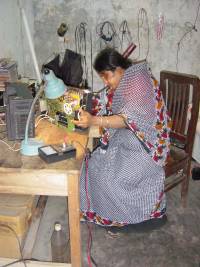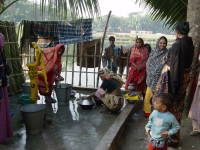Background and Objectives

The objective of the project was to alleviate poverty in the urban communities through community empowerment and capacity building for local government, NGOs and Community Based Organizations (CBOs).This was be done with direct financial support for community-level basic services and infrastructure, skills training and group businesses. By the project's end, partner communities were healthier and more integrated into the social and economic networks of the urban areas; local governments will have enhanced human resources and financial capacity, and they developed and implemented pro-poor policies impacting on national level policies.
Activities
The main activities included:
* Communities prepare action plans identifying needs such as the provision of water supply and sanitation;
* Provision of basic services and community infrastructure on a community contract basis with financial support from a project community development fund and technical support from town teams and local government;
* Apprenticeship programmes, support to group businesses and other direct poverty alleviation activities supported by a poverty alleviation fund;
* Community empowerment through community-organised savings and credit programmes;
* Capacity of local government and elected representatives developed by project supported training, experience sharing and through their involvement in the financial, technical and approval processes.
Results (Completion 2007)

* Over 5,600 Primary Groups established and 622 Community Development Committees covering over 650,000 people in the 11 project cities and towns;
* The 5,600 Primary Groups serve as savings and credit groups whose total savings were about USD1.4 million at the end of the project. These groups will continue to operate beyond the life-span of the project;
* 1,287 community contracts completed for a total amount of USD8.2 million. These comprise of 31,600 twin pit latrines, 3,750 tube wells as well as footpaths, drains, streetlights and community halls;
* Supported 7,290 apprenticeships in all project towns improving skills and creating job opportunities;
* Involvement of Government through functioning ward-level Project Implementation Committees and town-level Project Coordination Committees created in all towns.
Development Partners / Partners
Development Partners: UNDP
Partners: Ministry of Local Government, Rural Development and Co-operatives, Local Government Engineering Department (LGED), Chittagong, Khulna, Rajshahi and Barisal City Corporations; Bogra, Gopalganj, Hobiganj, Kushtia, Mymensingh, Narayanganj and Sirajganj Pourashavas (Municipalities)






































